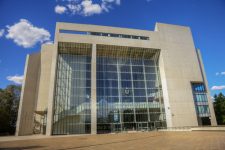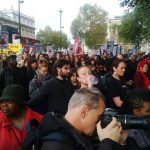High Court Rules that Anti-Protest Laws are Unconstitutional

A former politician’s recent win against the Tasmanian government calls into question the validity of anti-protest laws around the country.
Former Greens Party leader Bob Brown is no stranger to standing up for what he believes in, and he’s long been an advocate of our freedom to peacefully protest.
When Mr Brown was arrested in Tasmania last year taking video footage of loggers, he and five fellow protesters were facing the full force of the state’s anti-protest laws. The laws, passed in 2014, gave police the power to prevent protests on business premises and access areas, and prescribed prison sentences and fines of up to $10,000 for those who protested on those private lands.
While charges against Mr Brown were eventually dropped, he went on to challenge the validity of the laws in the High Court.
Rights in Australia
Australia is one of the few developed countries not to have a federal bill of rights.
Although the ACT and Victoria both have bills of rights, any contradicting Commonwealth law will prevail and render laws embodying those ‘rights’ invalid.
In fact, only five rights are expressly guaranteed by the Australian Constitution:
- The right to vote (Section 41),
- Protection against acquisition of property on unjust terms (Section 51 (xxxi)),
- The right to a trial by jury for criminal cases in the higher courts (Section 80),
- Freedom of religion (Section 116), and
- Prohibition of discrimination on the basis of State of residency (Section 117).
There is no express right to free speech.
Implying freedom of political communication
Section 7 of the Australian Constitution requires the Senate to be comprised of representatives who are “directly chosen by the people of the State”, while section 8 similarly requires that the House of Representatives “be composed of members directly chosen by the people.”
In the case of the Australian Capital Television v Commonwealth (1992) , the High Court relied on these provisions to find that the constitution enlivened a system of government whereby the people directly elect those who are in power.
This means members of parliament are representatives of the people, who are chosen by, and accountable, the public. This, the court found, essentially gives rise to a freedom of political communication.
The court found that the freedom empowers individuals to:
“communicate his or her views… criticize government decisions and actions, seek to bring about change, call for action where none has been taken and in this way influence the elected representatives…
The court added that:
“Absent such a freedom of communication, representative government would fail to achieve its purpose, namely, government by the people through their elected representatives.”
The freedom, the court found, is not restricted to communications between the public and government – it extends to political communications between individuals and groups within the community, and a range of methods of communication, including speech, written publications and actions on matters of political significance.
High Court win against anti-protest laws
This week, the High Court ruled 6-1 that some parts of Tasmania’s anti-protest laws contravene this right to freely communicate political views through the act of demonstrating. The court also ordered the Tasmanian government to pay legal costs.
Anti-protest laws that protect ‘big business’ have been introduced in many states around Australia, affecting our freedom to peacefully protest against issues we feel strongly about.
In addition to its formidable legal arsenal against protesters, the Australian police have been buying up Long Range Acoustic Devices – or LRADs – for some time. LRADs were designed for military use and are capable of controlling crowds through loud, piercing sounds, similar to jet engines.
Those who’ve been subjected to LRADs say they can induce splitting headaches, panic attacks, and even cause permanent hearing loss. More than half of Australia’s police forces now own an LRAD – including Victoria, Western Australia, South Australia, Queensland and New South Wales.
NSW’s first anti-protest case
In New South Wales, tough new anti-protest laws were introduced by the Baird government in 2016.
At the time, they were heavily criticised for protecting ‘big business’ against concerned citizens. The laws gave police extra powers when dealing with protesters, and introduced prison sentences of up to 7 years for anyone unlawfully accessing mining sites.
These laws are expected to be tested for the first time by three people from the small NSW town of Wollar. Bev Smiles, Bruce Hughes and Stephanie Luke were arrested and charged during a peaceful protest against a Planning and Assessment Commission hearing into the expansion of the Wilpinjong Coal Mine near where they live.
It is alleged the trio were stopping traffic from entering the mine, but not hindering anyone wanting to leave. They were charged with rendering a road useless and obstruction, after allegedly creating a human blockade.
The NSW Environmental Defenders Office, which is representing the Wollar trio, is cautiously optimistic that Bob Brown’s victory will have a positive impact on NSW case. The Office will be looking more closely at the High Court’s decision to determine the extent to which it applies to NSW laws.
Hugh de Kretser, executive director of the Human Rights Legal Centre, is even more positive, stating that the High Court’s ruling “will strengthen challenges against the NSW laws.”








